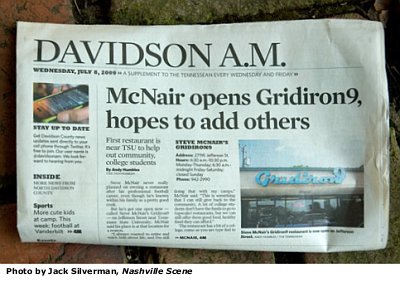Friday, 17 July 2009
From my mailbox...

Appears all.those.layoffs.at.the.Star included everyone who knew from apostrophe’s...
Posted by: Old Grouch in
The Press
at
01:28:26 GMT
| Comments (3)
| Add Comment
Post contains 15 words, total size 2 kb.
Monday, 13 July 2009
I linked this column by Carl Cannon in the Noonan post below, but I want to do so again to highlight this important bit of what’s-wrong-with-the-media wisdom contained therein:[1]
Concerns about “liberal bias†arose [even during the]... supposed Golden Age [of newspapers], but we had an answer for that: Sure, reporters are liberal, we told our sources, but the publisher is conservative. The ideal being peddled was that, yes, a Depression-era reporter making $8 a week will likely pen pieces extolling the New Deal, but meanwhile the owner/publisher is commissioning editorials lamenting Franklin Roosevelt's assault on capitalism. It sounds esoteric now, but when newspapers were king it worked...[2]So what changed?
If being “liberal†now meant sympathy for the Democratic Party, and being conservative implied sympathy for Republicans, all those liberal newsrooms across the country were gradually going to alienate themselves from about half their readers.Cannon’s thesis makes an interesting contrast with that of Kenneth Anderson. In Cannon’s world, newsrooms were always “liberal;†the shift in institutional balance (and the resulting loss of reader acceptance) was (mostly) a result of external factors (e.g., the replacement of newspapers by radio and television as a hard-news source; the realignment - and ideological purification - of the political parties). Anderson, on the other hand, acknowledges the “two audiences†model while positing a conscious business decision (at least in the case of the New York Times) to taylor its product to its perceived market:
That this might pose a problem never dawned on the men and women who controlled the media – even as it drove their right-of-center readers and viewers away in droves. When I tell my friends working in places like The New York Times that they created Rush Limbaugh, they respond with shock and disbelief.
The Wall Street Journal, by contrast, always had to remain anchored in the core presentation of semi-specialized facts and data to satisfy a hard nosed business audience, but it wrapped that staid, fact-oriented newspaper around a conservative, polemical editorial page, while keeping them emphatically separate, and so got two national audiences for one paper. The Times could not do that. It correctly understood that its new, national target audience was what David Brooks famously called the Bobos, the market oriented yet professional, bourgeois yet bohemian, affluent and self-regarding, self-involved elites of the major cities. [This audience] didn’t seek facts as such from the New York Times. They already had the ones that really mattered from other, more specialized sources.[3]...What the Bobos sought instead... was a cultural attitude, confirmation of who they were. The Times, for them, was less about sense than sensibility...One shortcoming of the two-audiences theory is that it fails to account for the success of the “reliably liberal†papers; those which had always combined a “liberal†(perhaps a better “golden age†characteriztion would be “populistâ€) editorial page with similar coverage point-of-view. But it does seem a possible starting point for building a successful paper,[4] and the theory could certainly lead to an interesting argument the next time you hear a bunch of old newsies bitching about the troglodytes on the editorial page.[5]
Another of Cannon’s points - the cluelessness of “the men and women who controlled the media†- ties exactly to Mark Steyn’s condemnation of the industry’s use of The Times as Market Model:
The net result of the industry’s craven abasement before the Times is that American newspapering is dead as dead can be — and certainly far deader than its cousins in Britain, Australia, India, or even Canada....although perhaps not so much in Steyn’s cited aspect of agenda-setting as in the failure of managers and owners to recognize that adopting the Times’ “Bobo†customer model would be doomed to failure anywhere except in the Times’ specialized market.
Cannon’s piece is also important because (to the best of my memory) this is one of the few times someone who qualifies as part of the media establishment[6] has openly acknowledged this dynamic. It’s unfortunate that it probably comes too late to qualify as anything but post-mortem analysis.
Still, if the decline of newspapers interests or concerns you, you’ll find much food for thought in both Cannon (start with paragraph 6, if you want to avoid the Sarah stuff) and Anderson. Read ’em both.
Thanks again to Roberta X for the pointer.
Related:
Previously:
-----
[2] Thus, papers had appeal for both “liberals†and “conservatives.†In citing this “two audiences†factor as one reason for newspapers’ past success, Cannon also notes:
The lone news outlet in North America that still operates under this model is The Wall Street Journal. Its editorial pages have been conservative for decades; a recent study found its news pages to be the most liberal in the mainstream media. Guess what: The Journal is the largest circulation paper in this country.
[3] The Snark in me says: This audience is one that already has its mind made up, (especially) doesn’t want to be confronted with contrary information, and uses its news media mostly for validation and reenforcement.
[4] Although not, by itself, sufficient.
[5] Had planned on linking a thread or two at Ruth’s Blog, but discovered that when she changed software a couple of months back she didn’t migrate the comments, so all I could find were a couple of rants about Gary Varvel. Sigh!
[6] I don’t include Bernard Goldberg.
Posted by: Old Grouch in
The Press
at
03:17:12 GMT
| No Comments
| Add Comment
Post contains 929 words, total size 12 kb.
Friday, 10 July 2009
Alarmed by a stabber-on-the-loose, Fillyjonk looks to the “local†newscast for more information:
Oh, you might be relieved to know that Michael Jackson is still dead. And that his family is still fighting over custody of his kids. And that that NFL player was killed by the girlfriend he was cheating on his wife with, because she suspected he was cheating on her with someone else. Oh, and OH NOES OBESITY! More Americans are fat than ever were before. And the poor economy is leading more people to abandon pets in shelters. Oh, and if you live alone, you’re lots more likely to develop Alzheimer’s, apparently.Real reporting is hard, and one dirty little secret of television news is that, despite all the trumpeting of “live, local, and first,†stations have never had the manpower to do it properly.[1] (It’s a paradox: The staff is so pressed to produce x minutes of material every day that they don’t have the time for digging into complex stories.[2])
NONE OF THIS IS NEWS.
What I WANT to know is this: Is it safe for me to leave my house, or will I be set upon by someone with a knife?
Not a WORD breathed of that. Then they shifted to a segment advertising a local “oxygen bar†(the heck?).
So, I took a deep breath, opened the door, walked to my garage, and got my car out. Obviously I was not stabbed or I would not be writing this.
But it FRUSTRATES me: is not the point of having a “local†channel to broadcast news that is happening “locally� If I wanted to hear extended speculation on Jackson’s estate, or discussion of 20 year olds who date married football players, or scaremongering health news: well, there’s CNN, and CNN headline, and MSNBC, and Fox News, and I think a couple of others?
So I don't know. I felt the same way a couple of years ago when we were having regular escapes from the local county jail (which is about 7 blocks from me the opposite direction of where the stabbing this morning was).
The fluff gets added for a number of reasons. It’s not (particularly) time-sensitive, it’s predictable (so no surprises in the production process), and it’s cheap(er).[3] Plus, there are still a few stations that operate under the misconception that women aren’t interested in hard news.
And, of course, the cheapest part of the news is the chat across the anchor desk.
Related:
Previously:
Via: CGH
-----
[2] There’s the old saw that the ideal TV news story is a fire: It stays in one place, continues for long enough for the mobile unit to get there, and yields lots of spectacular images, just for pointing the camera. Car chases also qualify, provided the station has a helicopter.
[3] There are even advocacy groups/PR firms/advertisers/government agencies who will provide complete “reports†(or just visuals, ready for local narration) covering their pet “issues.â€
Posted by: Old Grouch in
The Press
at
19:20:32 GMT
| No Comments
| Add Comment
Post contains 534 words, total size 5 kb.

Jack Silverman:
I was caught off-guard when Scene art director Rob Williams called yesterday to ask if I had seen this week’s Davidson A.M. [a weekly neighborhood supplement to The Tennessean - o.g.]. He had been shocked to pick up his copy (in Germantown), only to find the following headline as the lead story: “McNair opens Gridiron9, hopes to add others.†With jaw dropped, I ran out to find mine wedged in the monkey grass along my walkway, and sure enough, Rob was right. The lead story talks about McNair’s new restaurant and features quotes from the now deceased quarterback. And the paper is clearly marked “Wednesday, July 8, 2009.â€Well, newsprint is expensive! Credibility, I guess, not so much.
…
Is it... common practice to go ahead and deliver said paper if it makes you look ridiculous?
Via: the comments at Gannett Blog
Posted by: Old Grouch in
The Press
at
01:46:07 GMT
| No Comments
| Add Comment
Post contains 140 words, total size 2 kb.
Wednesday, 08 July 2009
James Lileks offers an amusing (and wise) look at the plight of newspapers:
I’ve had more fun at the job in the last two years than ever before, and I’ve also seen more enthusiasm, initiative and out of the box thinking. For instance: what if we sell the box? No one’s been in the box for years.All this, plus The Faces of The Price is Right. RTWT.
Posted by: Old Grouch in
The Press
at
17:53:28 GMT
| No Comments
| Add Comment
Post contains 70 words, total size 1 kb.
Sunday, 05 July 2009
Scott Rosenberg:
...Before the critiques gets too self-righteous, let’s recall that the blurring of editorial and business lines is happening everywhere. Magazine journalism is full of it. We will see even more of it as the business of print publishing continues to decay and publishers scramble for revenue. The Post’s “salons†aren’t the first instance of this kind of aggressive monetization of a journalistic reputation, and they won’t be the last.Let me know how well that argument works the next time you’re handed a speeding ticket.
Elsewhere:
July 2: WaPo responds to flyer controversy
James R. Rummel: A Question That Needs to be Asked
Via: Instapundit
-----
Posted by: Old Grouch in
The Press
at
04:47:53 GMT
| No Comments
| Add Comment
Post contains 161 words, total size 3 kb.
Wednesday, 01 July 2009
I won’t spoil the punchline on this one. Just read this, then reflect on the difference between “reporting some facts†and tying all the loose ends together.
As to the story itself...
Sometimes Karma is a bitch.
HT: Turk, who follows up on the follow-up.
Posted by: Old Grouch in
The Press
at
21:41:54 GMT
| No Comments
| Add Comment
Post contains 63 words, total size 1 kb.
51 queries taking 0.0762 seconds, 196 records returned.
Powered by Minx 1.1.6c-pink.














